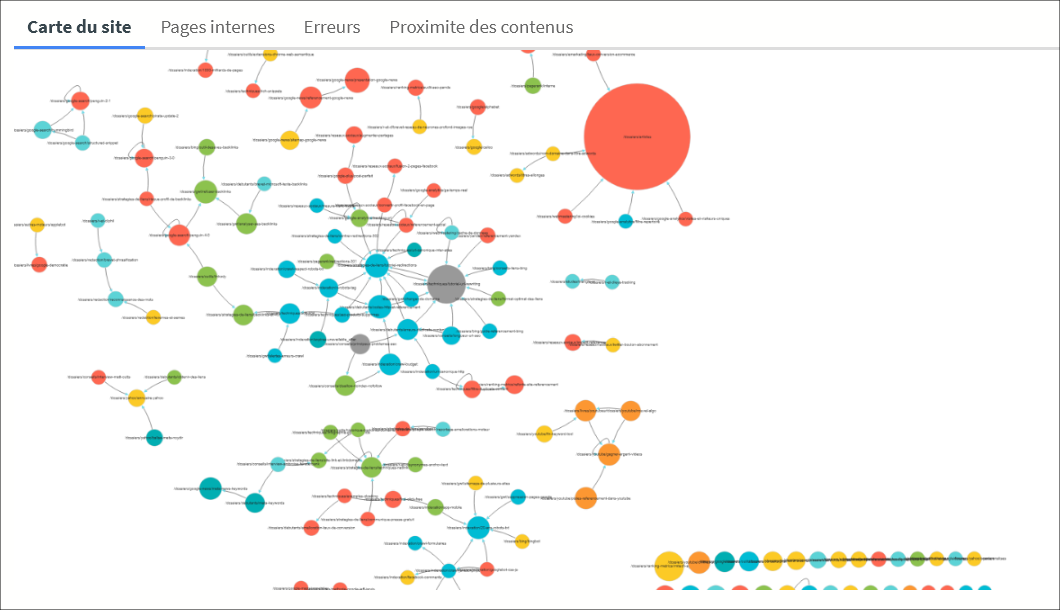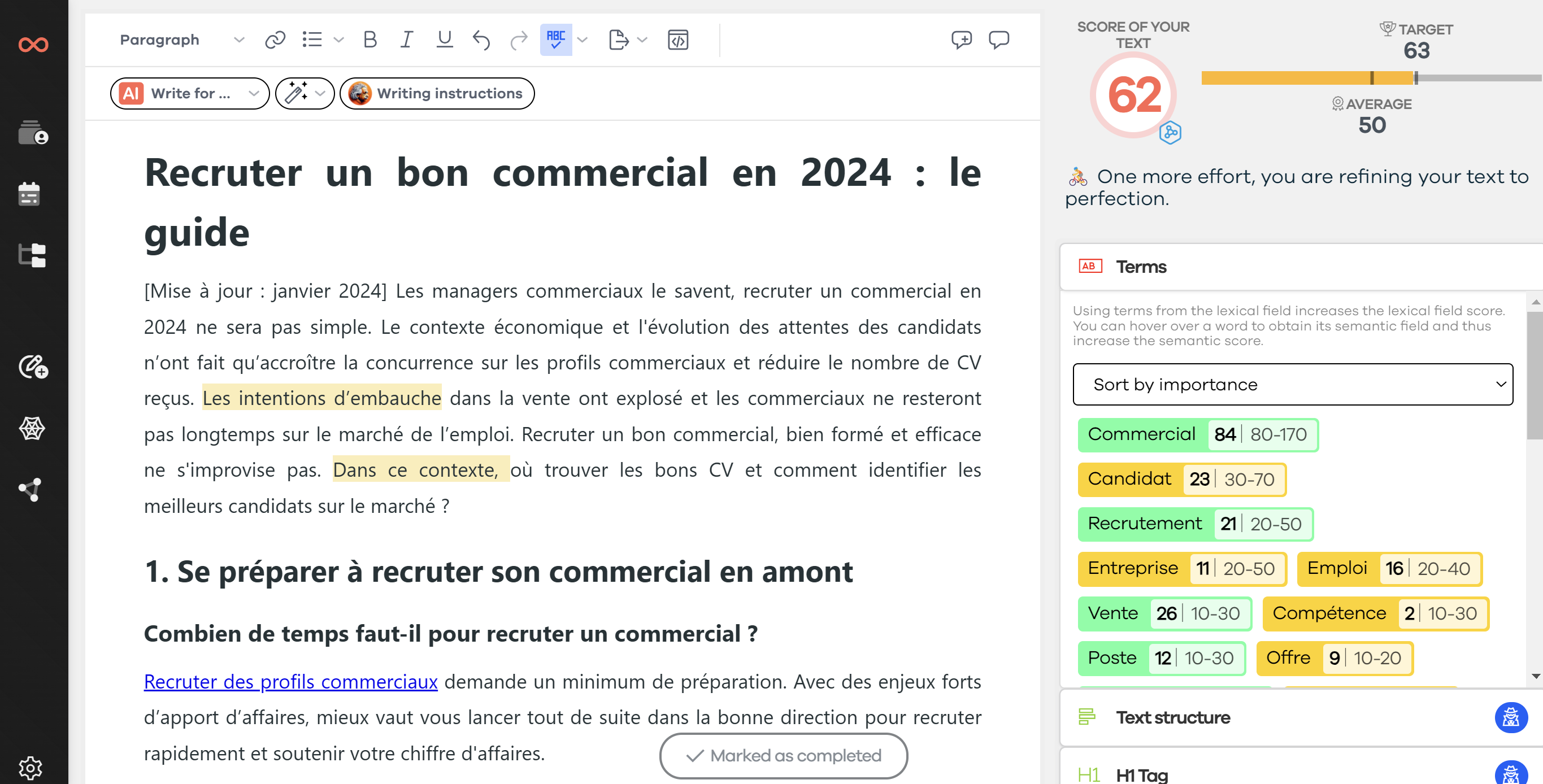Keyword cannibalization occurs when multiple pages of the same site are optimized for the same keyword. These scattered contents lead to the division of each page's authority rather than its unification.
Keyword cannibalization is an easy phenomenon to understand. Identifying it, however, can prove difficult. Some keywords are often used because they correspond to general topics. Others, on the other hand, are specific and are usually addressed in depth in a single publication.
To assist us in detecting the phenomenon of cannibalization in SEO, we are currently developing a new tool: the semantic crawler. More information coming soon :-)

Site Map - Representation of a website: the bubbles are the pages, the lines represent the links.
🧟 Definition of keyword cannibalization
> Keyword cannibalization occurs when multiple pages of the same site are optimized for the same keyword. Cannibalization mainly affects large blogs, as the same topics are covered multiple times, inevitably leading to the repetition of certain keywords.
The phenomenon of cannibalization and content duplication must be differentiated.
Using the same keywords in a small number of publications is not a problem. Cannibalization only occurs when a significant number of publications use the same keyword for the same main topic. In these articles, the keyword can be repeated more than ten times. Therefore, publishing multiple articles on the same topic can be characteristic of a lack of thematic coherence.
Does keyword cannibalization harm SEO?
A high number of publications optimized for the same keyword can have negative consequences on SEO. Search engines hesitate to rank a publication well when there are other similar articles on the same site.
The search engine may conclude that these publications are incomplete and fail to provide a sufficiently relevant response.
Of course, some articles are more complete than others, especially if you use long-tail keywords. However, it is in your best interest to merge similar publications. Because a longer article is not necessarily harder to read.
How to avoid keyword cannibalization?
Experienced web copywriters avoid keyword cannibalization by specifying the main keyword of their other publications. In this way, they avoid reusing the same keyword and adopt a more specific and unique angle.
Avoiding cannibalization of your keywords forces you to keep track of each publication and their keywords. If you plan your content several months in advance, you already know which articles are about to be written and you can easily avoid these repetitions. On the other hand, if you write your content without planning it, remember to:
- choose the main keywords of your article
- check if these keywords are already used on your blog
- If they have already been used: update the existing publication
- If not: write the publication as initially planned
To check if you are already covering the topic on your blog, a simple Google command like site:mysite.com [KEYWORD]

In addition, to avoid keyword repetition, copywriters use synonyms. However, be aware that search engines are now capable of grouping words with similar meanings.
✅ How to check if there has been keyword cannibalization?
You can check your content using a spreadsheet in which you list the main keywords of each publication. Then check if a keyword has been used twice or more. This is the most accurate way to perform a thorough check to identify SEO cannibalization.
Example of SEO cannibalization case detected by SEOQuantum (Semantic Crawler tool):
Cannibalization cases are not common on small blogs. In our example, we crawled the entire excellent blog of WebrankInfo, several hundred articles are published on natural referencing.
In our example, a case of cannibalization was spotted on the following two pages:
- https://www.webrankinfo.com/dossiers/google-search/penguin-2-1
- https://www.webrankinfo.com/dossiers/google-search/pingouin-4

The information was reported to the Webrankinfo team, a content correction is in progress. This cannibalization was also detected by their zombie pages method.
This type of tool is handy when you have hundreds or even thousands of publications to analyze. Reading them all would take you weeks, which is clearly unrealistic.
How to solve keyword cannibalization?
SEO consultants solve cannibalization by focusing on keyword management, user intent, semantics, internal linking, and merging duplicate pages.
There are no miracle solutions for bloggers who want to correct keyword cannibalization: you absolutely must review all your articles on the same topic and choose one of the solutions presented below.
1 - Analysis of user intent
In SEO, user intent refers to the context in which the person performing a search query is located. User intentions can be grouped as follows:
- information i.e. the desire to obtain information on a subject (cf. guides)
- commercial i.e. commercial searches (cf. product lists, reviews)
- transactional i.e. transactional searches (cf. buy product X, cheap service Y,...)
Thus, writing several articles on the same subject is not a problem when the targeted user intent is different.
An example?

Here for the key phrase "web writing", www.redacteur.com was able to find two search intentions of the user:
- The web writer profession (how to start the activity)
- Web content writing
2 - The semantic universe
The keyword clustering relies on the algorithms of modern search engines. Bing, Google, and others index websites, blogs, and web pages based on the topics they detect on the page. These topics are expressed through a lexical field or semantic universe, i.e., the keywords associated with a subject.
The semantic universe of a subject is composed of many synonyms, variants, inflections, and related expressions. Instead of using the same keyword multiple times, choose a more precise synonym (or conversely, more general). Avoid too similar topics, as Google and other search engines have a great understanding of synonyms.
Beware of the phenomenon of indirect cannibalization. For example, "hand saw" and "wood saw" are considered identical by most search algorithms. Thus, writing about these two subjects could harm your SEO due to cannibalization.
3 - Internal linking
Another way to remedy keyword cannibalization without deleting or merging content is to highlight one of the pages through an appropriate internal linking strategy. As you know, links are extremely effective signals that are taken into account during indexing. Search engines consider inbound links as proof of a page's reputation.
Using links to prioritize certain content is a technique comparable to the content pillar strategy (see keyword clustering above).
4 - Merging content
The most dreaded solution is to merge duplicated pages or delete obsolete or short content. First, list each publication that uses the same main keyword for the same subject. Then, go to your Search Console or any other analytical tool and identify the best-ranked page. This page should be enriched by the other content on the same topic.
SEO cannibalization a common phenomenon
Keyword cannibalization is often unintentional, and consultants or bloggers must absolutely plan regular checks and correct any duplicates. Avoiding and correcting repetitions requires some planning of content writing, but also a lot of communication between different people (SEO consultants, planners, designers, copywriters...).
Manually analyzing your content is a tedious task, but remember that you are the best person to understand your content strategy.
As always, revise, update, and don't hesitate to refresh!
Need to go further?
If you need to delve deeper into the topic, the editorial team recommends the following 5 contents:

